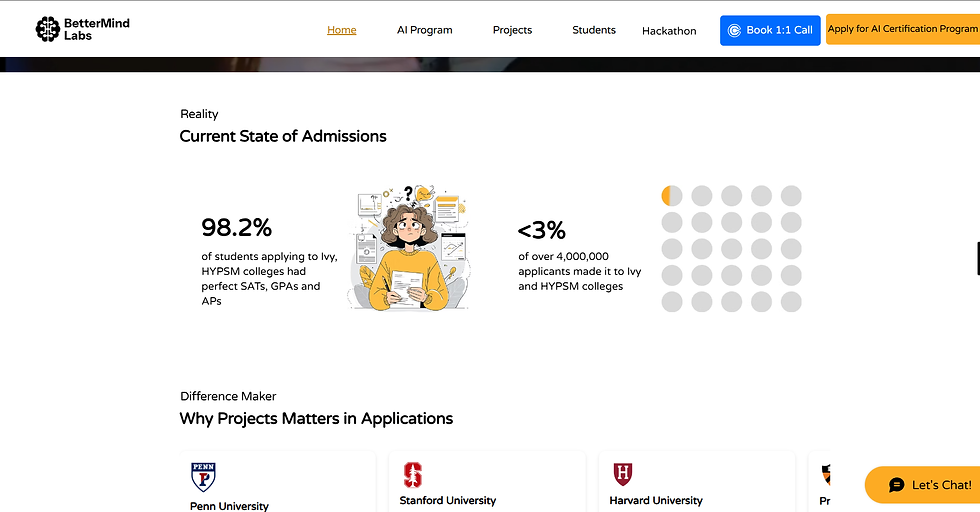How to Handle a Low AP Score on Your College Applications
- BetterMind Labs

- Oct 12, 2025
- 4 min read
Updated: Oct 28, 2025
The Problem with Overvaluing AP Scores

What Admissions Officers Actually Want to See

Let’s cut through the myths. Colleges don’t admit the “highest test-takers.” They admit future contributors to their intellectual community. An AP score can confirm rigor, but it doesn’t differentiate you.
Research shows that 85% of selective colleges report that AP coursework favors admission. Leveraging Your AP STEM Scores…. But note the phrasing: “AP coursework,” not “perfect AP scores.” What admissions officers want is proof that you challenged yourself, not just a number on a report.
The real differentiators fall into three buckets:
Narrative consistency: Does your academic story align with your goals?
Original output: Have you built something that proves skill and creativity?
Mentored excellence: Did an expert validate your work through guidance or a recommendation?
Ask yourself: if your AP scores were stripped away, would your application still carry authority? If the answer is no, you need a strategy shift.
Why Perfect AP Scores Aren't the Golden Ticket

Many families believe a string of 5s on AP exams guarantees admission to elite universities, but this is a common myth. In today's competitive landscape, thousands of applicants present flawless transcripts and test scores. As a result, perfection has become average.
Admissions officers see AP scores as just one small data point. They confirm you've taken a rigorous course, but they don't differentiate you. The hard truth is that colleges don't admit the "highest test-takers"; they admit future contributors. They are searching for a spark of originality and proof that you can apply your knowledge to solve real-world problems.
The Power of a Standout Project

If your AP scores were removed from your application, would it still show your passion and ability? If the answer is no, a strategic shift is needed. The antidote to a weak score isn't more test prep; it's tangible, project-based proof of your skills.
Consider two applicants for a top engineering program:
Student A: Perfect 5s on all APs, but no projects outside of class.
Student B: A mix of 3s and 4s on APs, but spent their summer building an AI model to predict wildfires, guided by a mentor.
Admissions officers consistently favor Student B. Why? Because a project demonstrates qualities that a test score never can: initiative, resilience, and the ability to create something new. A low AP Biology score can be reframed by an independent genetics project. A weak AP Computer Science score is overshadowed by a real-world app you developed. Projects demonstrate vision, and admissions officers remember vision.
A Strategic Path Forward with BetterMind Labs

So, how do you build a project that turns a perceived weakness into an undeniable strength? The most effective approach combines four key elements:
Structured Foundation: Learn advanced concepts in a clear, mentor-led environment, not through random online tutorials.
Expert Mentorship: Work alongside industry professionals who can provide guidance and lend credibility to your project.
Real-World Output: Create a finished product, an algorithm, a prototype, or a research paper that serves as a powerful portfolio piece.
Third-Party Validation: Earn a certificate or a strong letter of recommendation that provides objective proof of your skills.
This is where Bettermind Lab programs come into the picture; these are designed to help ambitious high school students transform their interests into high-impact AI projects. Your GPA and AP scores are the foundation, but a mentored project is the steel frame that makes your application rise above the rest.
Frequently Asked Questions
Q: Should I even report a low AP score?
A: At highly selective schools, report only 4s and 5s. At moderately selective institutions, 3s are fine. Anything below? Leave it out—focus instead on your coursework and projects.
Q: Can a strong project really outweigh weak AP results?
A: Absolutely. Admissions officers are trained to look for initiative and creativity. A mentored, completed project shows intellectual maturity that a test score cannot.
Q: Can I just self-learn AI or coding to build projects?
A: You can start that way, but most students hit roadblocks. A structured, guided program ensures you not only finish but also produce something credible that experts can vouch for.
Q: What if I already have good AP scores? Should I still do projects?
A: Yes. Even perfect scores don’t differentiate you in elite admissions. Projects are what turn a “smart student” into a “future innovator.”
Final Thoughts
The fixation on AP scores is one of the biggest blind spots I see in admissions. A low AP score feels like failure in the moment, but in reality, it’s a signal: you need proof of depth, not just breadth.
As someone who has sat in the decision room, I can tell you AP scores confirm ability, but projects define identity. And identity wins offers.
If you’re serious about transforming weak scores into a powerful admissions advantage, look for programs that combine structured learning, real-world AI projects, expert mentorship, and a final letter of validation. That model exists. In fact, it’s exactly what BetterMind Labs has built for ambitious high schoolers aiming for top-tier universities.
Explore more on bettermindlabs.org. Your low AP score doesn’t define you. What you build next will.





Comments